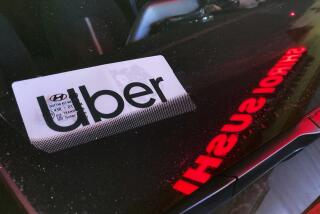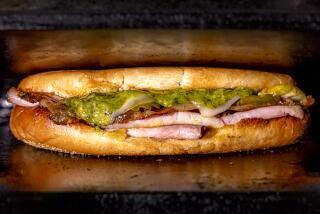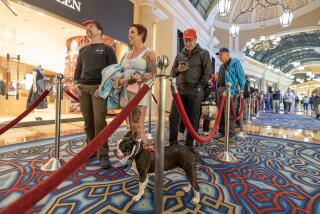Luxury doesn’t have to come at a price in Las Vegas
Luxury has a new look and feel in Las Vegas, a more accurate reflection of the economic downturn’s effect on bank accounts, home values and egos. Across Las Vegas, the focus on approachable luxury is apparent in menus with more affordable selections, value-added hotel packages and, perhaps most welcome, renewed attention to customer service.
Tom McCartney, president and chief operating officer of the recently reinvigorated Tropicana, calls the new service model “mass customization.” That oxymoron is possible now that hotels are training staffers to use social media, smartphones and mobile applications that enable speedier replies to visitors’ special requests.
“It’s identifying needs that people talk about wanting, but that they’re not quite sure how to access,” McCartney said.
Hoteliers are giving customers VIP attention once lavished only on top gamblers. Now, thanks to technology, your every tweet is their command.
The process can start with a pre-arrival email, once a hallmark of pricey lodgings, which seeks individual preferences so the hotel can deliver a faster check-in, your preferred room location, pillow type or Coke instead of Pepsi in the minibar.
At the Tropicana, a full-time staff scans social media to monitor up-to-the-minute feedback on customer experiences and expectations, key factors in creating a personalized experience. “Texting a customer is a great way to communicate one to one,” McCartney said.
The extensively remodeled Tropicana features such appointments as pillowtop beds, in-suite spa tubs and gourmet poolside dining. Though a room may cost only $60 a night, or $200 for a two-room suite this summer, McCartney said the hotel is dedicated to five-star service. Employees have been trained to observe customer preferences, elicit them through conversation and note them in databases that follow visitors from the check-in desk, to the restaurant, pool and beyond.
Though 12-course tasting menus and four-figure bottle-service tabs haven’t disappeared, they’re being nudged out by more accessible concepts, said Michael Morton, a restaurateur who sold his Nine Group steakhouse and nightclub properties in Las Vegas late last year.
In his new venture, Morton teamed with hotel developer Steve Wynn to create La Cave Wine & Food Hideaway, a stylish but casual restaurant in a cozy wing of the Wynn hotel. The small-plates menu keeps prices under $20, including beef filets on crostini with blue cheese ($16) and salt-roasted beets with whipped goat cheese and pistachios ($8).
In the less formal Las Vegas, affordability is paired with a new emphasis on comfort, said Morton, who designed the restaurant to suit both the casually dressed visitor as well as the luxury traveler.
In retooling Las Vegas post-recession, hospitality pros have tweaked the city’s everything-in-excess image, said Alicia Malone, a spokeswoman for the Las Vegas Convention & Visitors Authority. With more travelers watching their wallets, the tourism agency is touting a city rich in resources, with 277 pools, 60 golf courses, 45 spas and 17 master sommeliers. Hotels have tweaked their message too.
“The notion of ‘let’s go have a great time and not worry about anything’ has changed,” said Bill Hornbuckle, chief marketing officer of MGM Resorts International. “People need to think they got a great deal.”
The new traveler psychology also means the consumer is in control: “Now you define for yourself what a great experience is,” he said. In turn, hotels are expanding guests’ choices through loyalty programs, bundling more kinds of amenities into packages and adding partners who can deliver discounts or exclusive access to stores, shows, clubs and more.
Giving luxury travelers more choice has proved successful at the Mandarin Oriental, Las Vegas, said general manager Rajesh Jhingon. Since opening about 16 months ago, the hotel has focused on delivering bespoke, personalized experiences: A signature spa treatment is customized to your needs, and hotel credits now can be spent at more places on the property. Similarly, a create-your-own bento box of Asian specialties at the MOzen Bistro has become one of the most popular menu items, Jhingon said.
Of course, luxury means different things to different people. The twenty- and thirtysomethings go for lavish daytime pool parties and nightclubs, while baby boomers prefer sit-down shows and spectaculars. Armed with databases of information culled from loyalty programs and repeat visits, the Vegas number crunchers are more accurately tailoring attractions to suit customer tastes, said hospitality expert Bruce Baltin, senior vice president for PKF Consulting.
Even wealthy travelers have become expert consumers who are willing to work hard to find deals, said Jim Taylor, vice chairman of the Harrison Group, a market research firm in Waterbury, Conn.
“They’re confident and resourceful about getting what they want,” he said. Compared with past years, spending on future weekend getaways, vacations, resorts and fine hotels by the affluent is likely to increase, according to the American Express Publishing and Harrison Group’s 2011 Survey of Affluence and Wealth in America.
The experts agreed that prices can be high as long as quality is too. The hoteliers will be ready for visitors, with doors and cash registers open.
“People want to have the best, but they also want to have value,” said Jhingon of the Mandarin Oriental. “Luxury will always come at a price, but now we know that people have to be able to say it was absolutely worth it.”
travel@latimes.
More to Read
Sign up for The Wild
We’ll help you find the best places to hike, bike and run, as well as the perfect silent spots for meditation and yoga.
You may occasionally receive promotional content from the Los Angeles Times.






